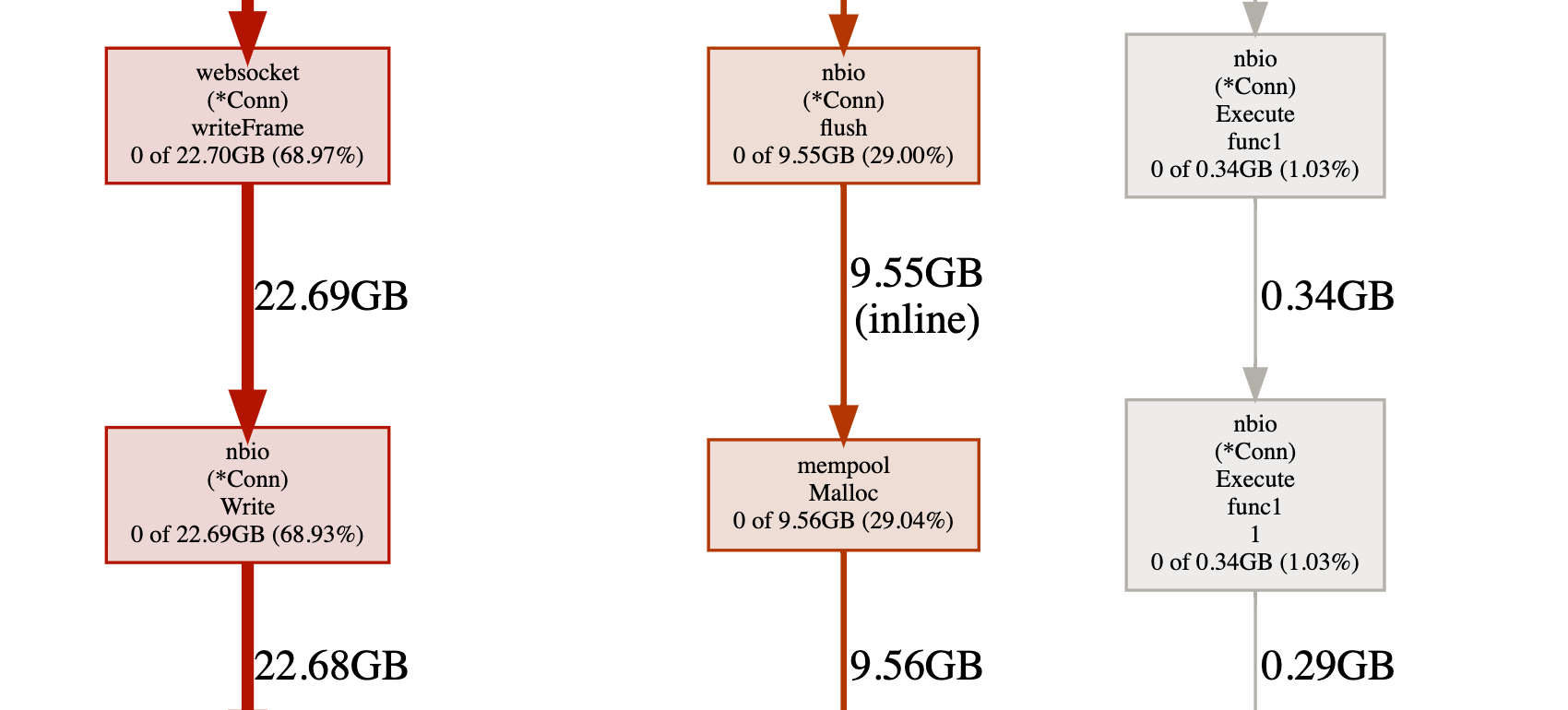- NBIO - NON-BLOCKING IO
- Linux: Epoll with LT/ET/ET+ONESHOT supported, LT as default
- BSD(MacOS): Kqueue
- Windows: Based on std net, for debugging only
- TCP/UDP/Unix Socket supported
- TLS supported
- HTTP/HTTPS 1.x supported
- Websocket supported, Passes the Autobahn Test Suite,
OnOpen/OnMessage/OnCloseorder guaranteed
- Implements a non-blocking net.Conn(except windows)
- SetDeadline/SetReadDeadline/SetWriteDeadline supported
- Concurrent Write/Close supported(both nbio.Conn and nbio/nbhttp/websocket.Conn)
package main
import (
"log"
"github.com/lesismal/nbio"
)
func main() {
engine := nbio.NewEngine(nbio.Config{
Network: "tcp",//"udp", "unix"
Addrs: []string{":8888"},
MaxWriteBufferSize: 6 * 1024 * 1024,
})
// hanlde new connection
engine.OnOpen(func(c *nbio.Conn) {
log.Println("OnOpen:", c.RemoteAddr().String())
})
// hanlde connection closed
engine.OnClose(func(c *nbio.Conn, err error) {
log.Println("OnClose:", c.RemoteAddr().String(), err)
})
// handle data
engine.OnData(func(c *nbio.Conn, data []byte) {
c.Write(append([]byte{}, data...))
})
err := engine.Start()
if err != nil {
log.Fatalf("nbio.Start failed: %v\n", err)
return
}
defer engine.Stop()
<-make(chan int)
}For more details: go-websocket-benchmark
# lsb_release -a
LSB Version: core-11.1.0ubuntu2-noarch:security-11.1.0ubuntu2-noarch
Distributor ID: Ubuntu
Description: Ubuntu 20.04.6 LTS
Release: 20.04
Codename: focal
# free
total used free shared buff/cache available
Mem: 24969564 15656352 3422212 1880 5891000 8899604
Swap: 0 0 0
# cat /proc/cpuinfo | grep processor
processor : 0
processor : 1
processor : 2
processor : 3
processor : 4
processor : 5
processor : 6
processor : 7
processor : 8
processor : 9
processor : 10
processor : 11
processor : 12
processor : 13
processor : 14
processor : 15
# taskset
run nbio_nonblocking server on cpu 0-7
--------------------------------------------------------------
BenchType : BenchEcho
Framework : nbio_nonblocking
TPS : 104713
EER : 280.33
Min : 56.90us
Avg : 95.36ms
Max : 2.29s
TP50 : 62.82ms
TP75 : 65.38ms
TP90 : 89.38ms
TP95 : 409.55ms
TP99 : 637.95ms
Used : 47.75s
Total : 5000000
Success : 5000000
Failed : 0
Conns : 1000000
Concurrency: 10000
Payload : 1024
CPU Min : 0.00%
CPU Avg : 373.53%
CPU Max : 602.33%
MEM Min : 978.70M
MEM Avg : 979.88M
MEM Max : 981.14M
--------------------------------------------------------------| IOMod | Remarks |
|---|---|
| IOModNonBlocking | There's no difference between this IOMod and the old version with no IOMod. All the connections will be handled by poller. |
| IOModBlocking | All the connections will be handled by at least one goroutine, for websocket, we can set Upgrader.BlockingModAsyncWrite=true to handle writing with a separated goroutine and then avoid Head-of-line blocking on broadcasting scenarios. |
| IOModMixed | We set the Engine.MaxBlockingOnline, if the online num is smaller than it, the new connection will be handled by single goroutine as IOModBlocking, else the new connection will be handled by poller. |
The IOModBlocking aims to improve the performance for low online service, it runs faster than std.
The IOModMixed aims to keep a balance between performance and cpu/mem cost in different scenarios: when there are not too many online connections, it performs better than std, or else it can serve lots of online connections and keep healthy.
package main
import (
"fmt"
"net/http"
"github.com/lesismal/nbio/nbhttp/websocket"
)
var (
upgrader = newUpgrader()
)
func newUpgrader() *websocket.Upgrader {
u := websocket.NewUpgrader()
u.OnOpen(func(c *websocket.Conn) {
// echo
fmt.Println("OnOpen:", c.RemoteAddr().String())
})
u.OnMessage(func(c *websocket.Conn, messageType websocket.MessageType, data []byte) {
// echo
fmt.Println("OnMessage:", messageType, string(data))
c.WriteMessage(messageType, data)
})
u.OnClose(func(c *websocket.Conn, err error) {
fmt.Println("OnClose:", c.RemoteAddr().String(), err)
})
return u
}
func onWebsocket(w http.ResponseWriter, r *http.Request) {
conn, err := upgrader.Upgrade(w, r, nil)
if err != nil {
panic(err)
}
fmt.Println("Upgraded:", conn.RemoteAddr().String())
}
func main() {
mux := &http.ServeMux{}
mux.HandleFunc("/ws", onWebsocket)
server := http.Server{
Addr: "localhost:8080",
Handler: mux,
}
fmt.Println("server exit:", server.ListenAndServe())
}Thanks Everyone:









